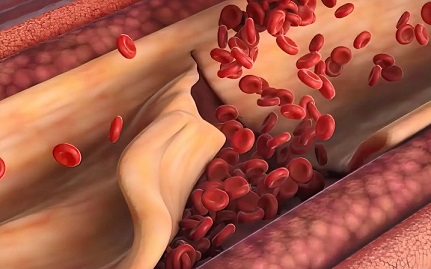Doctors Warn That COVID-19 Infections Can Cause Spontaneous Tears (Dissections) In The Walls Of The Coronary Artery!
Nikhil Prasad Fact checked by:Thailand Medical News Team Mar 03, 2024 1 year, 11 months, 2 weeks, 3 days, 23 hours, 1 minute ago
COVID-19 News: The COVID-19 pandemic, caused by the SARS-CoV-2 virus, has not only ravaged the respiratory system but has also left an indelible mark on the cardiovascular system. While the cardiovascular implications of COVID-19 have been extensively studied, a lesser-explored realm is the potential link between COVID-19 and Spontaneous Coronary Artery Dissection (SCAD). SCAD, characterized by a tear in the coronary artery wall, poses a unique threat as it can lead to heart attacks or even cardiac arrest. This
COVID-19 News report delves into the intricate relationship between COVID-19 and SCAD, combining insights from studies conducted at the University Hospital of Patras-Greece, Hippocration General Hospital, and the National and Kapodistrian University of Athens-Greece.
 COVID-19 Infections Can Cause Spontaneous Tears (Dissections)
COVID-19 Infections Can Cause Spontaneous Tears (Dissections)
In The Walls Of The Coronary Artery
Thailand
Medical News would like to add that a number of case reports and studies have also validated that SARS-CoV-2 infections can cause these spontaneous tears in the walls of the coronary artery which can lead to heart attacks and also fatal outcomes.
https://journals.sagepub.com/doi/10.1177/2050313X20975989
https://journal.chestnet.org/article/S0012-3692(22)01575-6/fulltext
https://recintervcardiol.org/en/scientific-letter/covid-19-and-spontaneous-coronary-artery-dissection-causality
https://onlinelibrary.wiley.com/doi/10.1002/ccr3.6399
https://www.sciencedirect.com/science/article/pii/S2589790X24000271
https://www.mdpi.com/2227-9032/12/2/214
https://www.cureus.com/articles/163122-spontaneous-coronary-artery-dissection-scad-in-an-atypical-patient-without-risk-factors-and-prior-asymptomatic-covid-19-infection#!/
https://www.minervamedica.it/en/journals/minerva-cardiology-angiology/article.php?cod=R05Y9999N00A23022703
al-literature-on-novel-coronavirus-2019-ncov/resource/ru/covidwho-1995813">https://pesquisa.bvsalud.org/global-literature-on-novel-coronavirus-2019-ncov/resource/ru/covidwho-1995813
https://www.cureus.com/articles/100030-spontaneous-coronary-artery-dissection-following-sars-cov-2-associated-multisystem-inflammatory-syndrome#!/
https://www.preprints.org/manuscript/202311.1941/v1
Cardiovascular Manifestations of COVID-19
COVID-19's impact extends beyond the respiratory system, affecting the cardiovascular system through various mechanisms. The virus utilizes the angiotensin-converting enzyme 2 (ACE-2) receptor, causing endothelial dysfunction, hypercoagulability, and inflammation. Cardiovascular manifestations include acute coronary syndrome, arrhythmias, cardiogenic shock, and cardiomyopathy. The interplay of systemic inflammation, direct viral effects on myocardial cells, and vascular infection increases the risk of myocardial infarction. Notably, macrophages and foam cells within plaques are susceptible to SARS-CoV-2 infection, leading to inflammation and plaque destabilization.
Understanding Spontaneous Coronary Artery Dissection (SCAD)
SCAD emerges as a rare manifestation of coronary artery disease, with up to 4% of acute coronary syndrome (ACS) patients experiencing it. More prevalent in females, SCAD often occurs without typical cardiovascular risk factors, affecting individuals between 44 to 53 years old. Predisposing factors include pregnancy, contraceptive pill use, hypertension, dyslipidemia, arteriopathies, connective tissue disorders, and emotional or physical stressors.
Pathophysiology of SCAD
SCAD, a non-traumatic rupture of the coronary wall, leads to acute coronary syndrome and sudden death. Two main hypotheses, "inside-out" and "outside-in," explain blood entry into the sub-intimal space or de novo intramural hematoma formation. Inflammation and connective tissue abnormalities contribute to SCAD pathophysiology. Autopsy reports reveal an inflammatory infiltrate in the outer connective tissue layer of affected coronary arteries.
Association of COVID-19 with SCAD: Possible Mechanisms
Several theories link COVID-19 to SCAD, suggesting a multifactorial process. Intense inflammation and endothelial dysfunction may cause sympathetic over-reactivity, leading to intimal dissection. SARS-CoV-2 infection induces T-cell infiltration, cytokine production, and protease release, increasing the risk of plaque rupture or erosion. Another mechanism involves angiogenesis stimulation and vasa vasorum proliferation, leading to intramural hematoma formation. Direct viral infection of coronary vessels can also weaken vessel walls, predisposing them to dissection.
Special Considerations and Case Reports
Male involvement in SCAD cases related to COVID-19 challenges the gender-specific trend seen in typical non-COVID-19 related SCAD. Symptoms vary, with chest pain being the most common, but some patients exhibit atypical symptoms. Diagnostic challenges highlight the need for advanced imaging techniques like intravascular ultrasound and optical coherence tomography. Management decisions, ranging from conservative pharmacotherapy to invasive interventions like percutaneous coronary intervention (PCI) and coronary artery bypass grafting (CABG), depend on clinical presentation and risk assessment.
Discussion and Management Strategies
The complex association between COVID-19 and SCAD necessitates careful consideration of diagnostic and management strategies. The heightened risks associated with revascularization procedures in SCAD patients underscore the need for individualized treatment based on clinical presentation. The psychological impact of SCAD, exacerbated by pandemic-related stressors, emphasizes the importance of addressing mental health in recovery.
Conclusion
As the world grapples with the evolving challenges of the COVID-19 pandemic, understanding its impact on various organ systems, including the cardiovascular system, is crucial. The intricate relationship between COVID-19 and SCAD warrants further research to guide effective diagnostic and treatment approaches. This article aims to shed light on the complex interplay between these two entities, emphasizing the need for ongoing studies and collaboration within the medical community to enhance our understanding and improve patient outcomes.
The study findings were published in the peer reviewed journal: Life.
https://www.mdpi.com/2075-1729/14/3/315
For the latest
COVID-19 News, keep on logging to Thailand Medical News.
